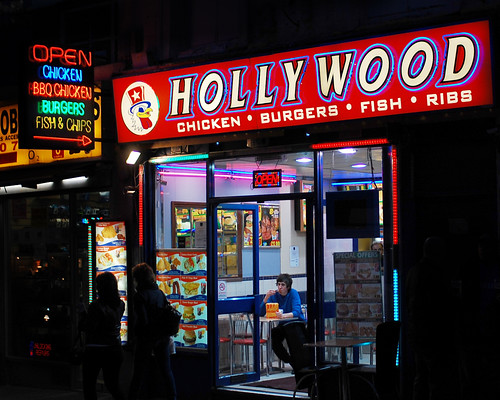I was dredging in the deep recesses of eBay the other day, trying to unearth treasures overlooked by the surface-scraping masses. A classic film camera to supplement my digital SLR was on my mind, but those that are popular (e.g. Contax G2) are expensive and those that say Leica are just ridiculous. Yes – in reference to my previous post – I'm in the market for a rangefinder camera, tempted by its near-silent shutter and quick and accurate manual focus. The Canon 7s could adequately substitute for an unreachable Leica M6 and has some fine glass of its own, but is exceedingly hard to find.
I didn't get the chance to make a bid, but I stumbled upon a radio receiver for next-to-nothing, an enormous flat box with a good name on it that would fit nicely on top of my stereo stack. Why was it so cheap? I guess these days people don't buy radios much. Everyone has a few already, and when it comes to spending money on something new, something really new holds more appeal: a digital radio, a radio alarm with iPod dock or a computer to stream any of that millions of stations that are online. I like the simplicity of one-button operation and might still fall for it, but there's an issue creeping in the dark.
Much like TV transmission, the radio signal is bound to be converted to digital, with FM frequencies going the way of the Shellac record or Betamax. Well, worse actually because if you have the player, you can still enjoy your records or tapes, but soon enough you won't be able to do anything with your radio. 2015 is apparently the final year for FM in the UK, though I can't believe the government is going to make millions of perfectly fine radios obsolete overnight. Seems like a most wasteful operation to me, especially since radios tend to just work.
And this brought me to another thought. Radios are a kind of messenger from the past, evoking memories of times when electronics developed calmly and cautiously. Even as little as fifteen years ago, you could grab any old bit of kit from your grandparent's sideboard and you'd recognize it and know what to do with it. You'd take it to your room, plug it in, and it would work as if new. A record player would play records, a tape deck tapes, and a radio whatever was on the air. Things didn't change much and didn't need replacing.
Now, everything is being upgraded all the time. What can't keep up is sent down the dreary one-way road of technological obsolescence. My old iPod mini has way too little storage to be useful. Thus, I got another. All of my laptops were powerful and furious beasts when I got them. Now they sit on my lap like old cats. They purr but don't have much bite and are reluctant to move.
I like stuff that lasts, stuff that's as good today as it was ten years ago. And if the FM signal is extinguished, there's really only one technology that remains with any sense of vigor – the good old film camera. Many old Nikons, Canons or Leicas still do exactly what they were designed to do, even if that was fifty years ago. It's enough to go out and stuff one's shelf.

